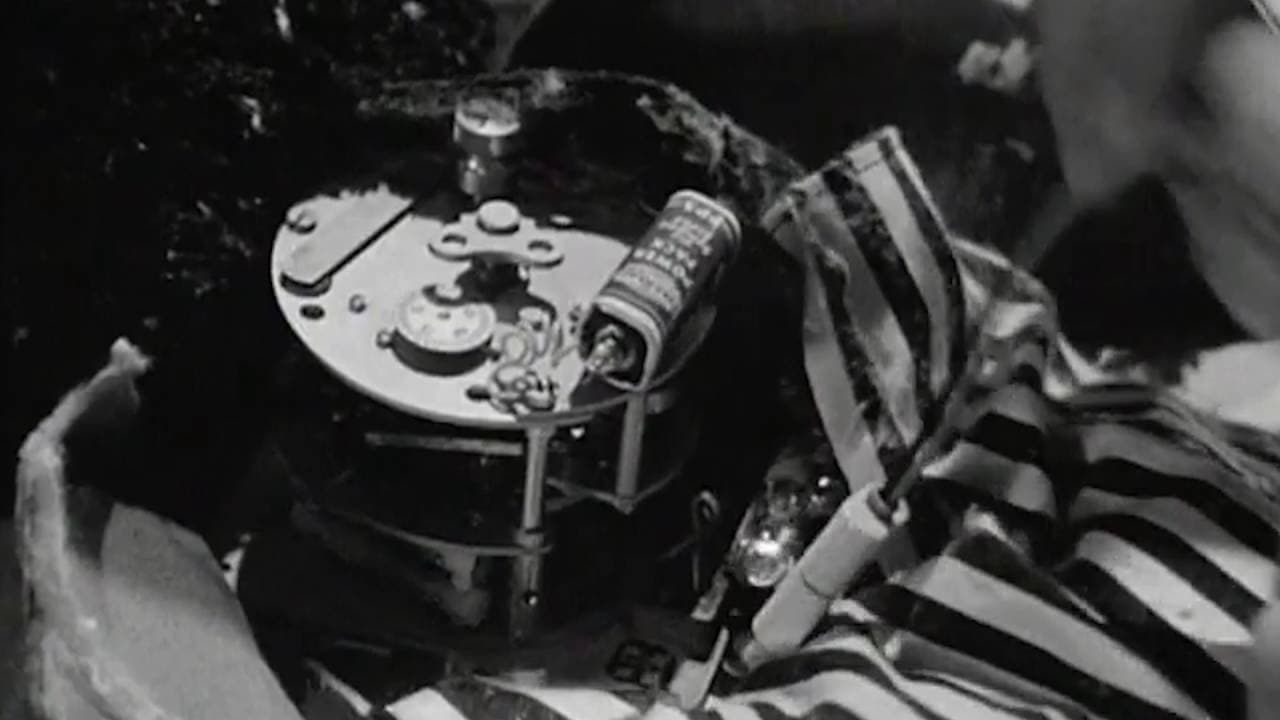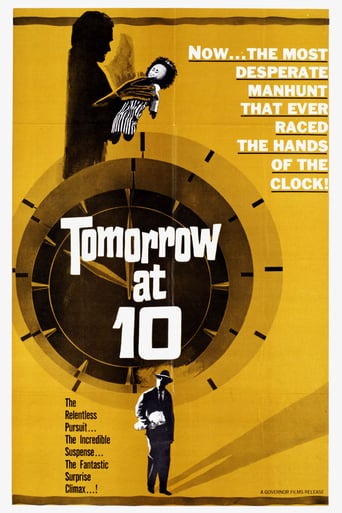Btexxamar
I like Black Panther, but I didn't like this movie.
Lidia Draper
Great example of an old-fashioned, pure-at-heart escapist event movie that doesn't pretend to be anything that it's not and has boat loads of fun being its own ludicrous self.
Kien Navarro
Exactly the movie you think it is, but not the movie you want it to be.
John Richards
Just an errata and clarification for some of the above:This little gem of a film is now under the ownership of Renown Films and is shown periodically on Talking Pictures TV (TPTV). The film was produced in 1962 as is confirmed by the titles (MCMLXII). It was released in 1963,but not well received, despite the presence of John Gregson who was a well known TV and film actor who often played the role of a police detective. However it was re-released in 1965, after Robert Shaw had appeared as the assassin Donald Grant in the second James Bond film From Russia with Love (1963). William Hartnel, who would subsequently play the first Dr. Who (1963 - 1966) also appears in a cameo as Freddie Maddox (frequently misspelled as Freddy), the father of George Marlowe (Maddox) and, with his wife Masie (Dorothy) Maddox are proprietors of The Golliwog Club.Marlowe is not whistling the theme to Z-cars as he constructs the 'golliwog bomb', but rather is whistling the old English nursery rhyme 'Pop Goes The Weasel' and even sings a couple of lines. He is whistling an unintelligible song as he enters Abots Mead and walks up the stairs - as he approaches the second floor landing whistling can be heard in the background but it is evident from the shot that he is not whistling. The last segment as walks across the landing to the nursery does,however, resemble the theme tune of Z-cars.The house from which Jonathan Chester is taken by the kidnapper is cited as being 14 Winnington Road, Hampstead, London N2. Whilst it is built in the neo-Georgian style of many of the larger houses towards the Highgate end of Winnington Road, it is certainly not the house which now stands there. It was in keeping with the area which wealthy financiers such as Anthony Chester (Alec Clunes) lived in the 50s and 60s.The house at which Jonathan Chester (Piers Bishop) was kept hostage is portrayed as 'Abbots Mead' in Wimbledon, described by the estate agent, Mr. Tamplin (Frank Hawkins) as a detached house on three floors. Whilst the Wolseley police car is certainly seen driving at speed down the A3 expressway (now the Kingston Bypass) the actual location has not been verified.
ronevickers
The most telling points of this neat little British second feature, are the strong cast of Shaw, Gregson, Clunes, Wheatley and Cope, allied with a lively script and tight direction from Lance Comfort. The plot is tidy and unfussy and proceeds well towards its somewhat novel conclusion. Robert Shaw is excellent as the disturbed kidnapper, Marlow, and sterling support is provided by John Gregson as the police inspector. Some of the scenes are a little over the top, especially the one concerning the dancers in the nightclub, which by today's standards is quite hilarious! Not a classic by any means, but well worth watching in any event.
fillherupjacko
A chap called Marlowe (Robert Shaw, Jaws fans) kidnaps a child of Hampstead parents by posing as the school-run chauffeur. After depositing the child in a deserted mansion, that resembles the one in Fallen Idol, he calmly turns up at the parent's house demanding 50 big ones. He's planning on catching the afternoon TWA to Rio see from where he'll book a long distance call to tell dad where his kid is hid. Now here's the clever bit. If he doesn't get his dough an explosive device hidden in a Golliwog will detonate tomorrow at ten – and he's given the Golliwog to the child for safekeeping.I bought this DVD from Best of British series issued by Odeon. It's the sort of thing which used to pad out afternoon schedules in the distant days of 3 channel Britain. It's directed by Lance Comfort, who made films for RKO in the 40s and even directed James Mason once upon a time. Comfort, however, never really made a big film and subsequently became lost in the culturally reviled wasteland of second features – many for Butchers Film Service. In recent years there's been an attempt to re-evaluate Comfort's work. There's even been a monograph by Brian McFarlane and one of his films was compared to Resnais on this very website no less (Pit of Darkness).This one is not quite typical of the second feature era. For a start it's a little bit later (1964) than that. Also there are a few moments that actually remove the film from the largely sealed world of the British B movie. There's even a cute reference to Z cars as Shaw whistles the theme tune while preparing the Golliwog bomb. Incidentally, I feel that an absence of any sort of popular culture from British B's of the 1957-63 era (new towns, West Indians, jeans, the teenage industry, etc) makes them strangely representative of their era. The fashion today for film makers to drench film soundtracks with the pop music of the film's era is not only a lazy way of establishing period flavour but to me rings false. Pop music may be all pervasive now for the ipod generation, if only superficially, but how many middle aged middle class people in the 50s/ 60s had any interest in pop culture beyond a vague awareness of Elvis and the Beatles maybe?No matter, this film features John Gregson in the lead, as Inspector Parnell investigating the kidnapping, and two stars of the future in the aforementioned Shaw and Kenneth Cope (Cope pops up at the – Er – Golliwog Club – the way the girls are dancing here has to be seen to be believed – and interrogates Renee Houston – who later pops up as his battleaxe mum in Carry On At Your Convenience, trivia fans). Ironically it's Gregson as the established star who is a bit miscast here. He's called to play a maverick cop who goes against his superior, Bewley (Alan Wheatley). Unfortunately, Gregson is far too meek and mild of voice and manner to carry any conviction. The film is very much of its decade though when it pits working class cop Parnell against patrician, hunt ball brown noser Bewley, who simply wants to let Marlowe skip to Brazil with his loot. Unfortunately what could have been a rip roaring barney between the two – one man embodying the 1950s and the other the 1960s – has all potential drama rung out of it by the laborious manner in which Parnell explains that perhaps this wouldn't be such a great idea ("What the hell are you talking about?")Better is the psychological stand off between Parnell and Marlowe as the Inspector tries to break Marlowe down with a seemingly innocuous line of questioning. We see a little glimpse of what a great character actor Shaw was to become; the authenticity of his behaviour and accent lifting the film momentarily out of the fusty B world into something more contemporary.
gordonl56
Robert Shaw kidnaps the child of a wealthy industrialist and stashes the kid in a rented house. He then just walks into the boy's family home and lays out his terms to the boy's father. 50,000 pounds in cash and no calling the police. Of course the police are called and headed by John Gregson put in a quick appearance. They are about to haul Shaw off to jail for a bit of third degree when he pulls out his ace in the hole. Shaws tells them that he has left the boy in a locked room with a time bomb. If he does not get the cash and then allowed on a flight to Rio, the boy will die. They have till ten the next morning to decide. The father loses his temper and supplies several right hands to Shaw. Shaw goes down in a heap smashing his head in on the fireplace. Of course Shaw dies without telling them where the boy is. Now how do they find the boy? It is the old race against time routine. It works though as they track down every possible clue before rescuing the boy in the nick of time. Nice cameo bit by William Hartnel as Shaw's father. Decent time-waster. (b/w)

